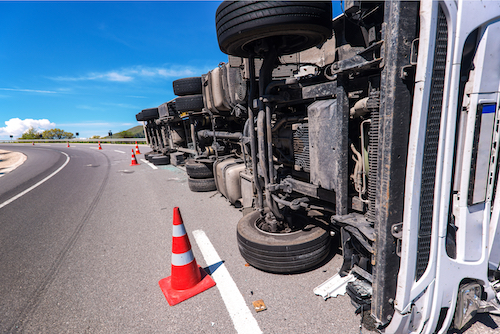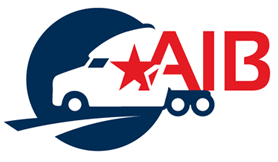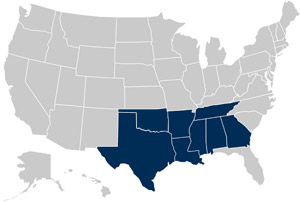Whether you’re rolling down the road in your own rig or manage a fleet of drivers, a commercial truck accident can always happen. Knowing the proper steps to take after an accident can help you minimize the risk to your drivers, yourself, and others on the road. American Insurance Brokers wants you to have all the facts you need if you or your drivers are involved in any commercial truck accidents. This is what you should know.
What Are The Most Common Types Of Trucking Accidents?
No matter the experience level of the driver, commercial truck accidents are possible at any time, in any place. The Federal Motor Carrier Safety Administration issues an annual report, the Large Truck and Bus Crash Facts (LTBCF), with major statistics surrounding commercial vehicles.
For 2018, their most recent year of comprehensive data, consider these sobering statistics:
- Large truck fatal accidents increased by 27% when compared to 2017
- From 2015 to 2018, fatal crashes in trucks weighing 10,001 to 14,000 pounds increased 330%
- There were just over 4,400 fatal truck crashes in 2018 and 107,000 injury crashes)
- The majority of fatal truck crashes occur during business hours, Monday through Friday
- Single semi-trailers are responsible for 55% of commercial truck accidents
In 2019, Louisiana commercial truck drivers were involved in 15% of fatal accidents, a number that seems small until you consider that there are generally more cars than trucks on the road at any given time.
There is no doubt that commercial trucks can be challenging to drive – and fatal in an accident – but what are the most common types of commercial truck accidents?
Jackknife
If a driver applies the brakes too hard and fast, the back end of the trailer swings around and forms a 90-degree angle with the cab. In this shape, it is impossible to steer a large truck and can often lead to an accident.
 Truck rollover
Truck rollover
When road conditions or operator error causes the driver to lose control, a commercial truck can rollover – once or multiple times.
Blowouts
Tires face extraordinary pressure on commercial trucks. A tire blowout can cause a truck to careen wildly.
Blind spots
Many motorists don’t understand the saying “If you can’t see my mirrors, I can’t see you.” Even the most experienced driver can miss a car traveling in their blind spot.
Wide turns
Some commercial truck drivers swing wide, away from their turning direction, as they make a turn. A car that does not understand that a commercial truck needs room on the left to turn to the right might get caught in a wide turn.
Rear-end
Because of their size, commercial trucks need more room to stop. Cars that stop short might get rear-ended by a truck that cannot hit the brakes fast enough.
Under ride
On the other hand, if a commercial truck stops short and the driver behind it does not, the smaller car might find itself wedged underneath the commercial truck. This is one of the deadliest types of commercial truck accidents.
Lost load
A shifting load that is improperly secured can tumble out of the truck. The possibility for accident and injury intensifies at high speeds or in busy traffic.
Head-on collisions and T-bone accidents are less common commercial truck accidents, but they do occur and can be fatal.
How Is Fault Determined In Commercial Trucking Accidents?
It’s first important to note that laws can vary widely from state to state. Start by contacting a lawyer in your state for more specifics.
As with any other type of vehicle accident, a police report that shows a clear “at-fault” action is the first way that fault is determined. However, a police report may only describe the scene as they see it and not assign fault or issue a citation.
If there is no clear fault assigned, then the investigation goes deeper. For multiple-vehicle commercial truck accidents, each vehicle has its own insurance adjustor who looks into all of the evidence surrounding the accident (see more on what evidence needs to be collected below).
In some cases, personal injury attorneys will need to step in to conduct their own investigations if insurance adjusters and police reports cannot clearly determine fault. They might work towards a settlement out of court, or they may bring it to a trial to determine if the commercial truck driver or another driver on the road violated local, state, or federal laws to led to the accident.
After fault is determined, who pays for any deductibles or damages that apply?
In general, independent contractors, or (truck drivers with their own rig,) and their insurance companies are financially responsible if they are found to be at fault. Fault can be determined by a police report, or it may be assigned as a result of a court case.
When it comes to a fleet owner with employees who drive for them, it becomes a little more complicated. The Latin phrase “respondeat superior” (“let the superior answer”) means that, very generally, a company can be held responsible for an accident that an employee causes. That’s why it’s crucial to have a comprehensive commercial truck insurance policy to protect your business.
However, the waters can get muddy if the driver is also an independent contractor – even if they don’t drive their own truck. This is where specific local regulations apply. Talk to a lawyer or insurance company in your area for a better picture of fault in this case.
What To Do If You’ve Been In A Commercial Trucking Accident
If you are involved in a commercial trucking accident, you can take steps to protect yourself from further injury.
Stop, and move to safety if possible
No matter how small the accident might seem, always stop. Leaving the scene of even the smallest fender-bender can have serious consequences.
To prevent further injury, if it’s possible to do so, move any involved vehicles out of traffic to a safer place. Pull into a parking area, turn off, or other location out of the flow of traffic.
Get help
After the vehicles are in a safe place, call 911 and ask for emergency assistance. This might mean police, emergency medical teams, or both.
It’s important to call the police every time, no matter how small. Your insurance company may require a police report to file a claim. A police report can also help to verify that you are not at fault.
Set up emergency alert devices
While you wait for help and if it’s safe to do so, set up emergency alert triangles or set off safety flares to warn others to slow down near the accident.
Verify driver information
If more than one vehicle is involved, exchange information from all other drivers. This includes:
- Driver’s license
- Insurance information
- VIN numbers for vehicles
Photograph the scene
Pictures can provide critical information if the circumstances of the accident are in debate. Take pictures or even videos of:
- Traffic signs or signals
- Blind spots
- Hanging foliage
- Unclear or unmarked lanes or turns
- Damage to vehicles
- Skid marks
- Debris in the road
- Property damage
Make a note of the weather and road conditions, too. Video is great for this and is widely available on smartphones.
Find witnesses
Many people do not want to be witnesses to an accident, but if there are people at the scene who are willing to report what they saw, ask them to remain until the police arrive. If that’s not possible, get their contact information before they go.
Contact your insurance company
Whether the accident is considered your fault or not, contact your insurance company immediately. They can help navigate communicating with other insurance companies and will work hard to get you or your drivers back on the road as soon as possible.
The best approach is prevention
American Insurance Brokers coordinates insurance coverage for commercial truck drivers across Texas, Louisiana, Arkansas, Mississippi, Alabama, Georgia, and Tennessee every day. We know how disruptive commercial truck accidents can be and can help make this difficult time easier for you. We can help answer questions you have or set up insurance options now so you have coverage for future accidents.
Fleet owners can also help by making sure all of their employees know what to do and who to call in case of an accident. This starts with outlining basic safety procedures as outlined above and ends with choosing the best insurance coverage for your fleet.
We Can Help
American Insurance Brokers works with companies big and small to connect them with competitive insurance policies in Alabama, Georgia, Louisiana, Mississippi, Tennessee, Arkansas, Oklahoma and Texas. We can help you make sense of your commercial insurance options, with common sense explanations of confusing terms and coverages.
A commercial truck accident is serious. You need protection against accidents. We can help you find the best coverage at the best price. Are you covered? Take advantage of our free policy review and contact us today!






